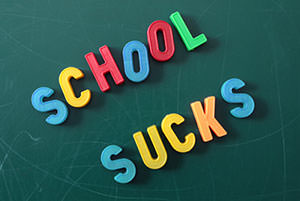Willful Defiance Against Suspensions
My 13-year-old son was recently suspended from his private school twice in less than a month.
By Frank PepperEditor’s note: The author of this piece is an urban high school teacher who is writing under a pseudonym in order to protect the privacy of his students and his colleagues.
My 13-year-old son was recently suspended from his private school twice in less than a month. Both times, it was for acts of defiance and rudeness that, while obnoxious, would not make a teacher at the much “rougher” (read: high-poverty) school I teach at bat an eyelash.
Good on the school for holding my kid accountable for being, well, a bit of a dick. He told a girl her lunch looked like feces, which is certainly not nice, and — allegedly, he reminds me — he was unhelpfully sarcastic to a phys-ed teacher who was struggling to motivate his charges. If the school, favored by families of professional intellectuals, has the time and resources to police mild douchiness, than all power to them.
This was not, however, my first reaction. I think it was something along the lines of: Suspended? Are you freaking kidding me? WTF?
This overreaction, carefully hidden from my kid and his mother lest I, myself, be charged with the crime of “enabling behavior,” was only partly due to the fact that the only rudeness or defiance consistently punished at my school of employment is that accompanied by fisticuffs or worse. Having pulled my son from the neighborhood public school when it took a bad turn, I was already used to his new school’s preciousness — something like the hall for geniuses Bart Simpson is sent to when he switches test scores with the class brain; all Swedish art furniture, MacBooks and math puns.
No, what I couldn’t believe is that a super-enlightened private school could be using suspensions, as outmoded a punishment as the rack.
A quick Google search or even the links off Wikipedia will provide the fact pattern discrediting suspension, and its derivatives, expulsion and in-school suspension. They are inconsistently doled out, hurt vulnerable students academically, and are disproportionately (at a 2-to-1 clip) given to African-American students.
Most importantly, they don’t, overall, benefit public schools, at least as those schools are currently constructed and operated. If such arcane punishments worked, their use wouldn’t have tripled in the past three decades.
Although my son has certainly been chastened and may benefit by what amounts to a shocking WMD of a wake-up call by the standards of his school, bringing that model to what I experience daily as “the real world” means sending already terribly unmotivated (and frequently depressed or otherwise mentally ill) kids to hang out in an empty home or on the streets for three to 10 days, only to return worse off than when they left.
Because the data generally back up this “common sense” argument, along with the whole racism issue, districts and even states like California have been aggressively pushing back on suspensions. A high suspension total is usually a big ding in official ranking systems, and a black mark on the principal’s record.
Yet suspensions are more popular than ever. The Los Angeles Unified School District, the second-biggest in the country, just took the radical step of outright banning suspensions for “willful defiance” — a vague classification that accounted for 55 percent of LAUSD suspensions. The mantra is: Suspensions reflect a school unable to use best practices to engage, motivate and manage students.
Why? Why are schools so dependent on a lazy and ineffective punishment?
Desperation, of course.
If you don’t have the time, expertise, compassion, staffing and/or resolve to meet a troubled student where he or she is and get to the root of the problem(s), removing the problem child from the playing field is not just tempting, it may well be the lesser of two evils. I say all this as a suspender, myself.
As a California public school teacher, I have the right under the state’s education code (and so superseding school policy) to suspend a student from my classroom for up to two full days. They stay on campus, but can’t enter my room: “You don’t have to go home but you can’t stay here.”
Have I done this? Yes, maybe once a year. I know the students most likely will be ignored by the administration while they are out of my room, I know they will fall (further) behind in my class and may get in more trouble while out. Yes, yes, yes. But there are times the students are simply too disruptive — and you are out of patience or out of strategies — and there are 30 other kids in the room. I consider this a failure, but those are a reality in our profession; like hitting a baseball, teaching is about minimizing the number of misses and maximizing the impact of your connections.
Continuing the metaphor, the big new pitch in discipline is an old idea with a new name. “Restorative justice,” already a successful staple of criminal court diversion programs, aims to replace punitive consequences and authoritarian enforcement with a model emphasizing the end benefit to the victim, community and, yes, the perp. Typically what this looks like is “court” made up primarily of one’s peers listening to various sides in a conflict and meting out a consequence that “restores” — apologies, repayment, community service — while also mediating ongoing, deeper frictions, such as between cliques, or a teacher and student.
The catch? If there is one, it is that restorative justice, like other interventions, takes an initially not-totally-trivial investment of resources — trainings, curriculum, on-site managers — as well as a good faith effort by professionals often too jaded or divided to buy in.
Nevertheless, like other good rehabilitation programs, the cost to society in the long run is far, far cheaper than accepting punishments that satisfy only our need for revenge. And if revenge is your thing, it is worth remembering that “restorative” punishments can be as onerous as the alternative.
I guarantee, for example, my son would have been more burdened to have to write an apology essay to his P.E. teacher than to spend a school day at home doing yard work. “I think I should thank the principal for suspending me, dad,” he said at one point. “Now everybody at school thinks I’m a badass.”
Your support matters…Independent journalism is under threat and overshadowed by heavily funded mainstream media.
You can help level the playing field. Become a member.
Your tax-deductible contribution keeps us digging beneath the headlines to give you thought-provoking, investigative reporting and analysis that unearths what's really happening- without compromise.
Give today to support our courageous, independent journalists.






You need to be a supporter to comment.
There are currently no responses to this article.
Be the first to respond.